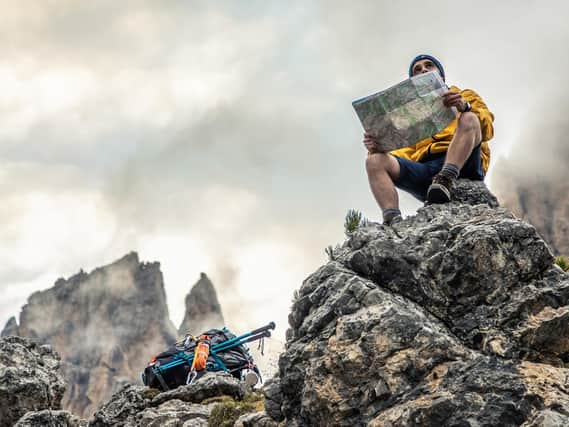Expert shares tips on how to stay safe whilst hiking on UK staycation


Rather than settle for a sunbed on an overcrowded beach, many staycation holidaymakers are sensibly seeking relaxation in more remote corners of the country – scaling mountains, scrambling across moors or wandering through woodlands.
Perhaps it’s a result of months spent confined to four walls, or a reflection of our growing affinity for nature – but there’s a new appetite for adventure and it only looks set to grow.
Advertisement
Hide AdAdvertisement
Hide AdUnfortunately, enthusiasm isn’t always matched by experience.
In Yorkshire, Calder Valley Search and Rescue Team said in June that it had become one of the busiest mountain rescue teams in the country, with a significant increase in callout requests. Team member Rob Freeman told The Yorkshire Post that people with the best intentions had been coming to grief with accidents that in many cases were relatively close to home.
He urged people to ‘adventure smart’ by planning a route and telling others where they would be, preparing for changes in weather, and sticking within the limits of their capabilities.
Elsewhere, Cumbria Police and Keswick’s Mountain Rescue Team have recently reported a “tidal wave” of avoidable rescues in the Lake District, involving groups of amateur hikers who were poorly prepared or ill-equipped. One of the main problems was a reliance on smart phone mapping apps, with no back-up when batteries drained.
Advertisement
Hide AdAdvertisement
Hide AdNow, Nick Giles, managing director at Ordnance Survey Leisure, has shared nine safety tips for novice hikers hoping to head for the hills.
1. Plan ahead. Before setting out, take a good look at a map and familiarise yourself with the route you want to take, he says. “Think about your own experience and capabilities, along with those of anyone going with you.”
2. Check weather conditions. “In autumn and winter, weather can vary over the course of a walk, especially in hilly areas,” notes Giles. “Have a back-up plan in mind in case the walk needs to be cut short.”
3. Brush up on navigation skills. Knowing how to read a map properly and navigate with a compass is essential, says Giles. “Refresh these skills as they could be vital. If you ever get in serious difficulty, being able to give the emergency services an accurate grid reference for your location can save valuable time.”
Advertisement
Hide AdAdvertisement
Hide Ad4. Wear the right clothes. Warm and waterproof clothing (multiple thin layers are always better than one thicker jumper), walking boots, and quality socks should keep you comfortable throughout your journey. “Make sure your kit is colourful,” he advises. “Black jackets are hard to spot against black rocks.”
5. Carry the right kit. “If you’re heading to the mountains or out for longer walks, you really should think about a survival bag, torch, spare batteries, whistle, spare clothes, hat and gloves, first aid kit, and spare food.”
6. Pack plenty of food and drink. To keep your spirits and energy up, make sure you pack a decent supply of food and water. “Eat or drink regularly to keep yourself hydrated and sustained.”
7. Let people know where you are. “Letting someone know where you are going and when you are likely to return is a good idea,” Giles adds. “Make sure you notify them when you return and agree a time frame when they should contact the emergency services if you don’t contact them.”
Advertisement
Hide AdAdvertisement
Hide Ad8. Always have a back-up. If you prefer to navigate with a GPS device, don’t forget to carry a paper map and compass as back-up in case it loses charge. It would also be an idea to carry a spare battery too, Giles advises.
9. Take litter with you. “Getting outside among beautiful landscapes is a fantastic experience, so protect it,” Giles concludes. “Take a small bag to keep any rubbish in, which can be thrown in the bin when you come across one.”
Editor’s note: first and foremost - and rarely have I written down these words with more sincerity - I hope this finds you well.
Almost certainly you are here because you value the quality and the integrity of the journalism produced by The Yorkshire Post’s journalists - almost all of which live alongside you in Yorkshire, spending the wages they earn with Yorkshire businesses - who last year took this title to the industry watchdog’s Most Trusted Newspaper in Britain accolade.
Advertisement
Hide AdAdvertisement
Hide AdAnd that is why I must make an urgent request of you: as advertising revenue declines, your support becomes evermore crucial to the maintenance of the journalistic standards expected of The Yorkshire Post. If you can, safely, please buy a paper or take up a subscription. We want to continue to make you proud of Yorkshire’s National Newspaper but we are going to need your help.
Postal subscription copies can be ordered by calling 0330 4030066 or by emailing [email protected]. Vouchers, to be exchanged at retail sales outlets - our newsagents need you, too - can be subscribed to by contacting subscriptions on 0330 1235950 or by visiting www.localsubsplus.co.uk where you should select The Yorkshire Post from the list of titles available.
If you want to help right now, download our tablet app from the App / Play Stores. Every contribution you make helps to provide this county with the best regional journalism in the country.
Sincerely. Thank you.
James Mitchinson